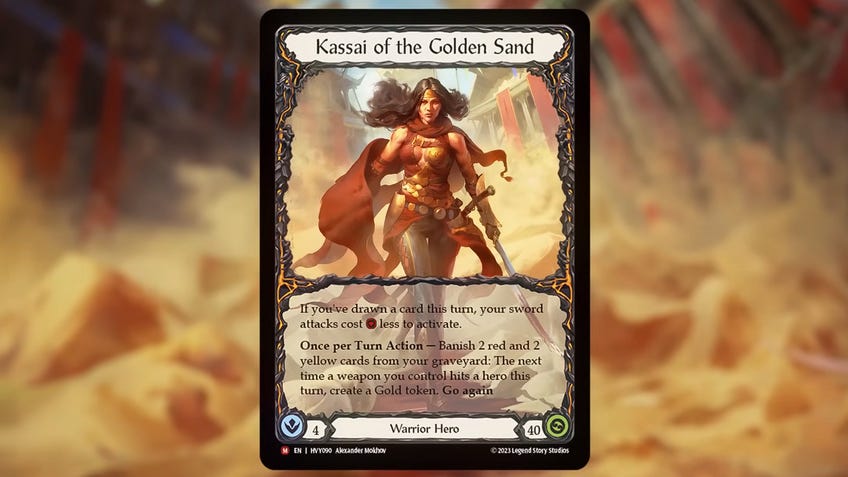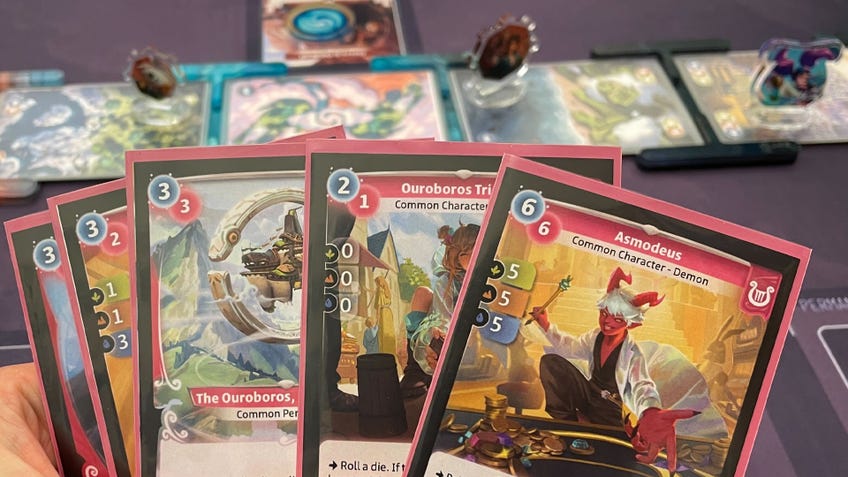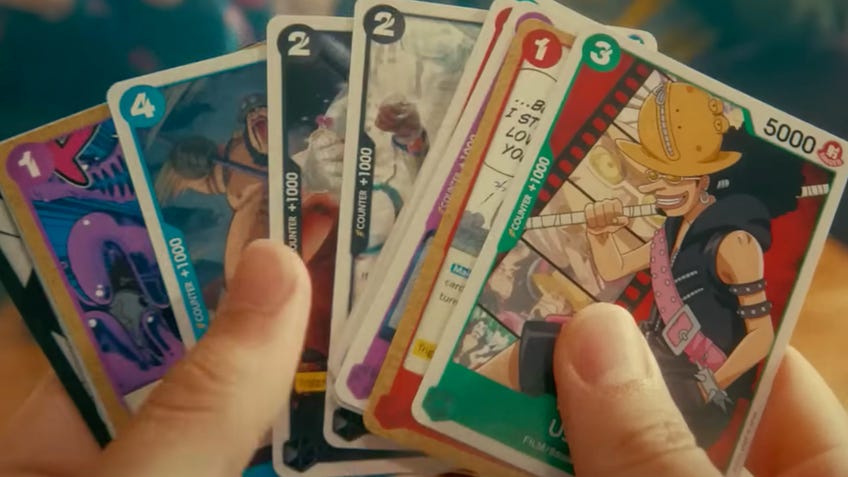Are we entering a new golden age of trading card games?
Gotta play 'em all.
It wasn’t too long ago that those looking to pick up the hobby of playing trading card games were essentially faced with three options. The seminal Magic: The Gathering is now, and always has been, the giant for Western audiences and the go-to for those looking for a heavily-played and well-supported collectible card game that can be enjoyed pretty much anywhere in the world.
Equally as chart-topping and prevalent, though generally more popular as a collectors’ item than a game, the Pokémon TCG provides a more colourful and family-friendly option favoured by younger audiences for its cute characters and easier-to-parse ruleset. Not to mention that Pokémon as a brand is an almost universally-beloved set of video games, animated series and toys to boot.
The slightly weirder cousin but third and final option would have of course been Yu-Gi-Oh!, a fever dream of a game that recently celebrated its 25th anniversary after originally spawning from the pages of a throwaway story in a manga that sees a school kid possessed by the ancient spirit of a pharaoh who makes him exceptionally good at playing children’s games.
Outside of that, smaller and more niche card games have come and gone over the years. Android: Netrunner, the living card game reboot of MTG creator Richard Garfield’s cyberpunk sibling to Magic, was once seen as a largely perfect card game that now predominantly survives as fan projects on the internet after being cancelled (again) in 2018. Many other such games still persist, but their player numbers dwindle every year.
As with many competitive multiplayer experiences, collectible card games require a lot of investment and a growing community for them to thrive. After all, you can build as many interesting decks in your favourite system as you please, but with no opponents to pit them against they’ll just sit gathering dust. TCGs live and die by their player counts.
For that reason it’s been easy for the big titles like MTG and Pokémon to rest on their laurels. No matter how cool and interesting a game might be, no matter how desperate you are to try it out and build decks for it, it’s been easier to get a game of Magic: The Gathering in because that’s what everyone else is playing.
You could argue Magic maker Wizards of the Coast hasn’t really had to bother to advertise its product as the best TCG, but simply to advertise trading card games in general and espouse the values of playing card games, as up until now it’s been largely the only option.
That may not be the case for too long. All of a sudden, the trading card game industry appears to be in a state of change. Brand new titles are hitting shelves at a rapid clip - and not just small indie productions or niche titles that are as gone as quickly as they arrive.
No matter how cool and interesting a game might be, it’s been easier to get a game of Magic: The Gathering in because that’s what everyone else is playing.
The biggest news in the last year has been the arrival of Disney Lorcana. Lorcana is a bold and impressive first shot into the TCG space from publisher Ravensburger, backed by what is by far the largest media conglomerate in the entire world in Disney. With gorgeous artwork and fun designs, a ruleset that delicately balances easy-to-learn mechanics with a high skill ceiling, and a newly-announced organised play tournament system, Lorcana looks here to stay.
The original set’s printing absolutely flew off the shelves, leaving fans hungry for more. All sorts of folks that have previously never even considered TCGs as a hobby are now cracking packs as hungrily as competitive Magic: The Gathering players. Not to mention the collector side, where the most valuable Lorcana cards from the original D23 promo printings are selling for thousands of pounds and enchanted rares fetch a pretty penny for those lucky enough to find them.

The standout indie success for most in the last few years has been Flesh & Blood, a trading card game that has built itself a small but dedicated hardcore audience of players. Even with a release right at the beginning of the pandemic in 2019, a strong push for monetary support towards organised play has made Flesh & Blood a competitive TCG worth investing in for high-level players.
For other games without the capital or name power to explode onto the scene like Lorcana, that seemed to be the goal for a while: to slowly build up a crowd rather than risk, and potentially lose, a shedload of money trying to make a gargantuan splash.
Other licensed titles have been seeing varying levels of success by pulling on the name recognition of their source materials. The Digimon Card Game has been making a splash with players looking to capture the nostalgic properties of Pokémon’s evolving critters with a slightly more crunchy system. The most shocking success, though, has easily been a title that those who don’t watch anime could easily have overlooked.

Shonen Jump’s flagship pirate adventure One Piece saw a trading card game adaptation hit shelves in 2022 to celebrate the manga’s 25th anniversary. One Piece is by no means a small franchise, being one of the longest-running and most popular Japanese anime and manga series of all time, but I doubt any would have expected the truly meteoric rise that the One Piece Card Game has seen over the past year or so. Card marketplace TCGplayer reported that the One Piece Card Game was the fourth-biggest seller on its platform at the end of 2022. (More recent figures are hard to come by, but everything suggests it hasn’t lost momentum.) Much like with Lorcana’s first release, it’s been difficult to get access to booster packs before they’re hoovered up by a hungry audience.
It seems as though the new class of trading card games are competing for that fourth spot behind MTG, Pokémon and Yu-Gi-Oh!, but the question is whether one of these newcomers will ever push out one of the big boys and cement themselves as a proper Top Three contender.
If there’s one thing that brand new card games entering the fold will improve, it’s making the scene as a whole much healthier.
The most refreshing thing about this new wave of card games is the consistently high quality they’ve all managed to strike. The currently-crowdfunding Altered TCG seems like a genuinely fresh take on the genre that looks to shake up how we consume and trade card games in general. Lorcana has become a genuine second game for me after Magic; while I’m sure I’ll still be playing Commander every week for the foreseeable future, I’m really keen for a new Lorcana scene to emerge so I can fully immerse myself in it.
Even Star Wars: Unlimited, the newest of the batch that’s largely failed to grab my own interest due to my general lack of love for Star Wars and an art style that is incredibly not-for-me, seems to be garnering a lot of genuine interest thanks to its big budget brand tie-in. It’s a title that feels unfortunately timed as it shares a lot of the same DNA with some of those other games like MTG and Lorcana, making it seem unoriginal in comparison. But it’s hard to imagine a world where a trading card game from a well known studio like Fantasy Flight Games and themed around something as gargantuan in pop culture as Star Wars doesn’t turn at least a few heads.
The greatest concern I have with all these amazing new titles coming out is the risk of them cannibalising each other. There’s only so much room at the table for new games and, just like games of the past that have fizzled out over time, if you can’t find a dedicated audience you won’t last long. Games like Star Wars: Unlimited and Lorcana have the upper hand in that department, able to recruit brand new faces to the crowd that are fans of their respective properties but new to card games in general.
I have all my fingers crossed that each of these games find the success they need to keep afloat. If there’s one thing that brand new card games entering the fold will improve, it’s making the scene as a whole much healthier. Having two or three big games dominate the market isn’t good for anyone. Companies get complacent and stagnate, players lose interest, and the hobby suffers.
Even if you haven’t yet been convinced to drop your lands in favour of ink or Don!, you should be thankful that these new games are shaking up the scene and bringing some new competition to your favourite TCG. In the end, just like a competitive meta, healthy competition for the top spot always makes for a much more engaging game for everyone else involved.


